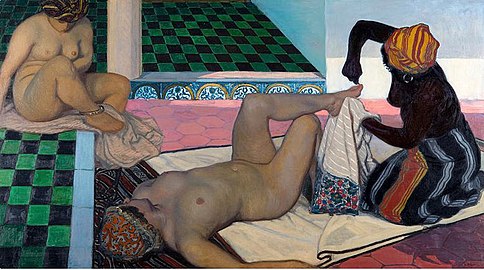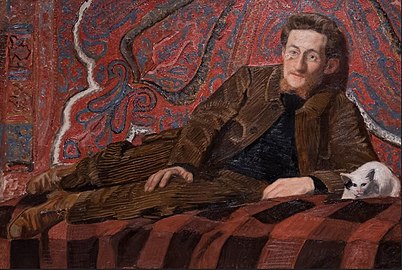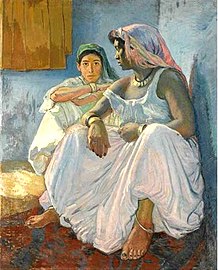Jules Migonney
This article includes a improve this article by introducing more precise citations. (May 2020) ) |

Jules Migonney (22 February 1876 – 5 July 1929) was a French painter and engraver known for his portraits and Orientalist scenes.
Life and work
He was born in
École nationale des beaux-arts de Lyon, where he was a student of Jean-Baptiste Poncet. He then studied with Léon Bonnat in Paris, and worked in the studios of Eugène Carrière. He also collaborated with Léon Carré, Charles Dufresne and Léon Cauvy
.
In 1909, he was awarded the
Moorish
culture. His work was interrupted from 1914 to 1918, when he served in the French Army, and there is a distinct difference in his pre- and post-war styles, the latter being more subtle.
After 1925, his health began to decline, and he became increasingly dissatisfied with his work. He committed suicide in Paris in 1929, leaving a note that said "J'ai tout sacrifié à l'art, il me tue" ("I sacrificed everything to art, it has killed me").
Many of his works may be seen at museums in
Centre Georges-Pompidou
.
Selected paintings
Sources
- Tristan Klingsor, "Jules Migonney", In: l'Art et les Artistes, Paris, January, 1926
- Léon Deshairs, Jules Migonney, Paris, Éditions Albert Levy, 1931
- Élisabeth Cazenave, La Villa Abd el Tif, un demi-siècle de vie artistique en Algérie, Association Abd el-Tif, 1998 pgs. 280–284, ISBN 2-9509861-1-0
- Élisabeth Cazenave, Les Artistes de l'Algérie, dictionnaire des peintres, sculpteurs, graveurs, 1830–1962, Bernard Giovanangeli Éditeur, 2001 ISBN 978-2-909034-27-0
External links
Wikimedia Commons has media related to Jules Migonney.
- Biography @ Patrimoine de l'Ain




